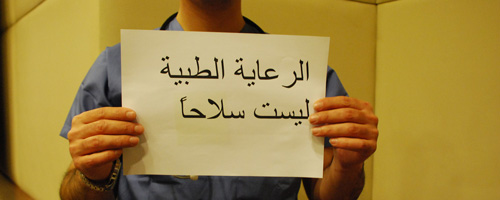Profession: Orthopedic Surgeon
Age: 35
by Simran Sachdev
Real names have not been used in this post in order to protect individuals’ security.
 Dr. Abo Mayar holds a sign that says, “Medical care is not a weapon.”
Dr. Abo Mayar holds a sign that says, “Medical care is not a weapon.”
“I am not afraid of death – but I am afraid I will lose my hands, and all my work is within my hands.”
After having endured the civil war in Syria for over a year, Dr. Abo Mayar decided to take his family out of the country and move to a town in Türkiye, close to the Syrian border. Moving out of Syria did not stop his commitment to his people, and he has continued to serve them at field hospitals – two of which he has personally seen targeted and attacked.
Once his wife and children were safe in Türkiye, Abo Mayar went to Aleppo to work at a field hospital. He worked there for 40 days until regime forces discovered the hospital’s location, leading to the hospital’s bombardment in October 2012; a rocket hit the building directly, destroying it. Present and frightened by the explosion, Abo Mayar ran to the cellar, two floors down, where he waited until the building collapsed. He remained hidden for about 40 minutes before he felt it was safe to leave. While he does not know of any colleagues dying in this attack, he recalled that many patients lost their lives.
After the hospital in Aleppo was destroyed, Abo Mayar and a larger group of doctors founded a field hospital on the Syrian side of the Turkish border at the end of 2012. This field hospital, where Abo Mayar still works, has been bombed four times, though the perpetrators have thankfully missed the main building each time. Abo Mayar believes that they have been targeted for treating the opposition. He and his colleagues now fear the slightest of noises, which remind the doctors of sounds from previous attacks. He says there is a “continuous feeling of fear because all those who work in this establishment are at risk of death, and we don’t know when it will be our turn.” The constant fear has also led to depression, anxiety, and a lack of concentration during his surgeries – thus affecting the quality of his work. He and his colleagues sometimes even fear their own patients, worrying that they may come strapped with a bomb to blow up the hospital.
While Abo Mayar acknowledges all that he and his colleagues have achieved at the field hospital, he laments about the numerous obstacles they continue to face, including being understaffed for the high volume of patients that they see each day and for the number of patients that require specialists. Lacking adequate resources, patients do not get the time they need for proper treatment. The electricity has given out in the middle of physicians’ surgeries, drastically affecting their equipment and concentration. Abo Mayar himself is performing 5 to 10 orthopedic surgeries each day, four days in a row – a high number of daily trauma cases. He treats victims of explosions, barrel bombs, shellings, and more. He says that he and his colleagues feel lonely and isolated, and do not have time to spend with colleagues and friends; they experience a spiritual vacuum lacking the time to pray; and of course, the physical fatigue is immense with the long and arduous hours.
Having lost all sense of joy and happiness in his work, Abo Mayar still makes the hours-long journey each week to cross the border into Syria to serve his people. His trek often includes waiting hours at a time for transport or for official crossing procedures to be completed. Sometimes when transport is unavailable, Abo Mayar is forced to walk a lot of the way, or must resort to hanging off the back of trucks that are passing by.
He told us, “My wife tells me goodbye with tears in her eyes as I leave her and my two children for four days each week. She is five months pregnant with our third child. It’s very difficult to leave your wife in a strange country while you work in another. On my way to the Turkish border, I feel tears coming from my eyes without any control because I am so sad leaving my family. I don’t know if I’m going to see them again or if I will die in Syria.” Each week, after Abo Mayar’s work inside Syria is complete, he makes the same arduous journey back home to reunite with his family in Türkiye.
Before the Syrian revolution started, Abo Mayar worked in a variety of medical facilities: a government hospital in Damascus, his own private clinic, and a few private hospitals where he picked up shifts. As of when he shared this story, the government hospital was still functioning, but he did not know the status of his private clinic. However, the private hospitals where he used to work had become targets of the regime; one was completely destroyed, while the other had been taken over by the government.
When asked why he became a doctor, Abo Mayar responded that one can get a job anywhere in the world by being a doctor. “Being a doctor is like having a toolbox that you can take everywhere,” he said. When he made his career choice, he was likely unaware just how indispensable this toolbox would become to the people of Syria.
Physicians for Human Rights has documented attacks on medical personnel and facilities in Syria in this interactive map.
